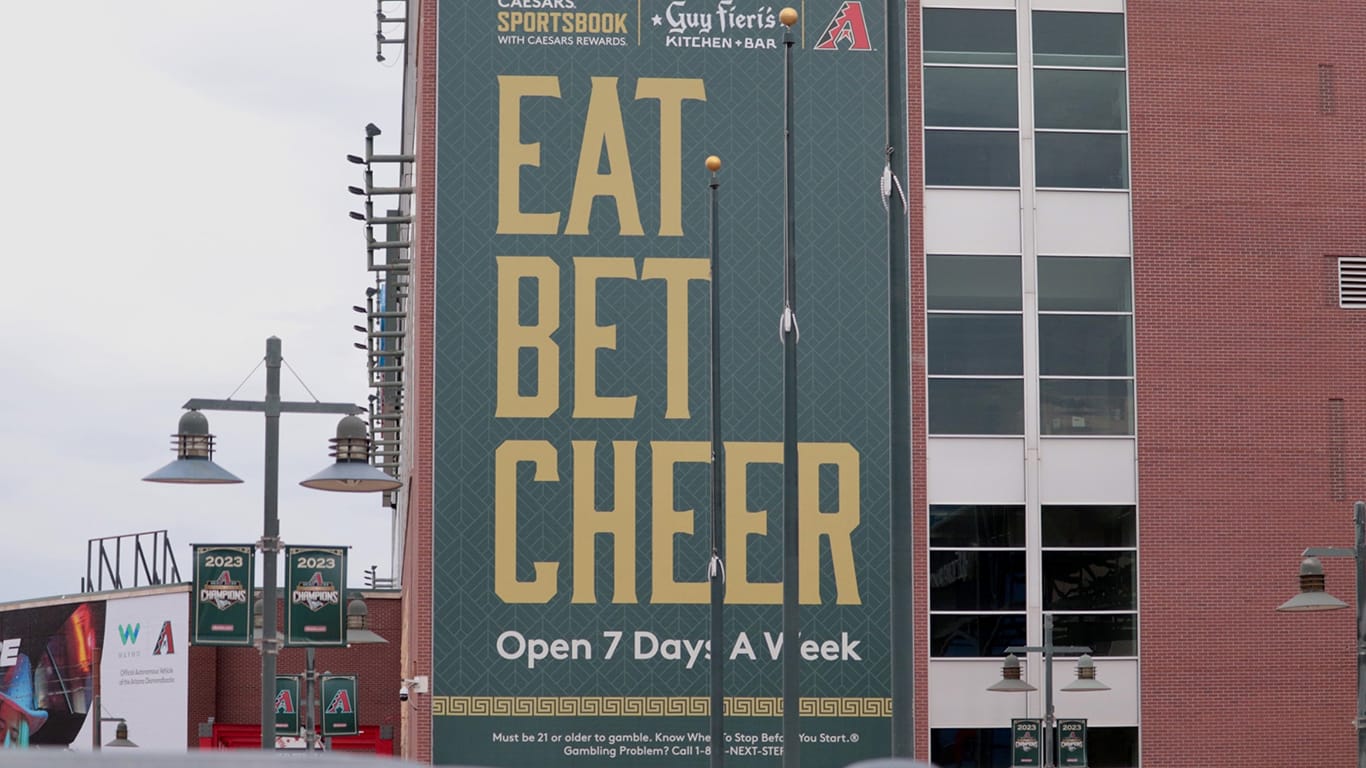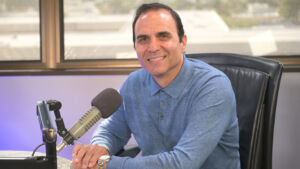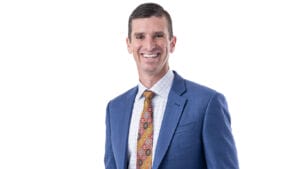When looking for a best bet, the data never lies. Since legalization in 2021, sports gambling has surged in the state of Arizona. In April, the state outpaced the betting mecca of Nevada, with almost $100 million more wagered at sportsbooks in the month, according to the Arizona Department of Gaming. With a checkered past related to wagering on sports, Arizona State University students have plenty contributed to the massive handle.
MORE NEWS: 136 Arizona companies make Inc. 5000 list for 2024
“I absolutely think sports betting has picked up a lot recently, especially just in classes and stuff. More of it being like a regular day activity rather than, ‘Oh we’re sports betting,’” said ASU student Douglas Santo. “I think you’ve seen it kind of infiltrate the classrooms, like it’s not something where people are trying to be quiet about or tiptoe around it.
“It’s here to stay, and people know that.”
While betting on college campuses is hardly a new fad, the legalization of sports betting in 38 of 50 states has certainly brought the daily betting lines out of the shadows. Gone are the days when ESPN spoke about spreads in innuendo, and here are the days of throwing over/under bets in math class.
“I would say mostly everyone I talk to has at least placed more than 50 sports bets in their life,” said ASU rising senior Brendon Pehar. “I find myself watching a game, and the first thing I ask about the game to my friend is, ‘What do you got on this?’”

This is not the first moment that sports gambling has swept ASU’s campus, as the school found itself wrapped up in a point-shaving scandal in 1994. Men’s basketball player Stevin “Hedake” Smith and teammate Isaac Burton pleaded guilty to conspiracy charges in 1997 stemming from bribes the duo took to fix games in the 1993-94 season. While attending the school, Smith racked up a $10,000 gambling debt to fellow student and bookie Benny Silman. As a way to repay his debts, and then some, the two devised a plan to have Smith shave points as the Sun Devils point guard that season.
While the point-shaving scandal of the 1990s highlighted the risks associated with gambling on campus, the recent legalization of sports betting has introduced new challenges. As sports betting becomes more normalized, it has been a major point of emphasis to separate the students from the school’s athletes.
Athletes like Smith, who still holds the Sun Devils’ record for most 3-point field goals in franchise history, are easily susceptible to being approached in a similar manner that he was in this new age of athletics.
“It’s very clear and often communicated to (ASU athletes) that they can’t be participating in sports betting, that’s inappropriate, their eligibility is at stake, but it’s even people around them,” said ASU athletic director Graham Rossini. “Even creating a connection to an app, people are going to find that out. It’s not worth it, it’s not worth the workarounds, trying to make sure everyone understands that there is extreme accountability.
“If someone is trying to engage and use insights or experience in a way that they can profit from, it’s just not worth the gamble, no pun intended.”
In addition to maintaining eligibility, athletes face increasing pressures from the pervasive nature of sports betting. Rossini also spoke on the damage that sports gambling can have on college athletes just trying to do their jobs within their sports.
Every athlete is accessible with just a few clicks on a screen with social media playing a prominent role in the consumption of competition.

“We’re noticing that there is increased pressure put on our student-athletes as a result of just sports betting,” Rossini said. “They’re all very visible personalities, people can find them on social media. They’re getting harassed, they’re getting these awful messages on, ‘How did you drop this pass? What a terrible play, you cost me hundreds of dollars and I can’t pay rent this month.’”
Rossini noted that the school has invested in mental health resources to address the pressure and criticism athletes face. Another adjustment he thinks could help is to eliminate prop bets in college athletics, which NCAA president Charlie Baker has suggested. Prop bets allow gamblers to bet on individual players’ performances and can single out specific players to receive even more vitriol should they leave a betting slip unfulfilled.
The pressures faced by athletes are just one aspect of the broader mental health challenges posed by sports betting. The impacts extend to the general student population as well. A study conducted by the NCAA found that 58% of young adults ages 18 to 22 have participated in sports gambling. Paul Gibson, Clinic Director of Ellie Mental Health in Tempe, expressed his concerns with these growing numbers for the new generations.
“With sports gambling, it’s a real dangerous thing because we have a generation that grew up playing video games, and the payoff is kind of similar to what was with a video game, but the reality is that it’s now costing real money,” Gibson said. “That’s going to be something that is really hard. Students are known to be poor, starving students, and when they’re taking their financial aid and applying it to gambling, that can be a real dangerous prospect because they still have to pay it back.”
While Gibson expressed that his clinic hasn’t treated many students for gambling addiction, he explained the patient numbers are on par given the sensitivity surrounding the nature of the activity..
“I think that people seek less help for gambling than they do for substance abuse,” Gibson said. “I think it is more socially acceptable to admit you have an alcohol problem, and to get help for that, than to admit that you have a gambling problem. I see that as more secret with people, and they don’t want to admit it.”
As numbers continue to rise in the state of Arizona, sports betting has always been prevalent on college campuses. Christopher Boan, the lead writer for BetArizona.com and the Gambling.com Group, expressed gambling activity is nothing new on college campuses.
“This has happened forever, it’s just now you can do it on your own phone,” Boan said. “I don’t think, in particular, anything’s really changed in terms of betting volumes. I think this would have been the demand that there would have been there on a college campus, like ASU, University of Arizona, NAU, GCU, etc., except now you have a legal avenue to do it.
“Whereas before, these kids were maybe having a buddy who could go to Vegas on the weekend who’s 21 and they would say, ‘Hey here’s 20 bucks, throw it on ASU to cover in week one of the college football season.”
Despite the many potential drawbacks for more young adults participating in sports gambling, Pehar expressed how he manages his emotions when it comes to wagering on the outcomes of games. He also found that sports betting led him to a new passion in the process.
“I have sports bet on every sport, but I try to stay away from sports betting heavily on sports that I care about more,” Pehar said. “Sports betting has allowed me to find a new interest in different sports that I may not have. For example, the Euros these past two months, I was paying attention to every game because I was betting on every game.
“I never knew, but it turns out, I love soccer now.”
While sports gambling is widespread across the Grand Canyon State, it is no accident that college students are a key contributor to handles within Arizona. The NCAA’s study found that 63% of on-campus students recall seeing betting ads and 58% of those students said they are more likely to bet after seeing those ads. These advertisements touting free bets and bonus money can be very enticing to students.
“There’s more and more kids turning 18 in some states, 21 in places like Arizona, that are going to be legal sports betting age, and obviously those are the those are the demographics that sports betting companies are targeting because that’s how they continue to roll up massive amounts of wagers,” Boan said. “People, as they get older, aren’t betting more, it’s that more and more people are turning of legal age. The younger they are, generally, the more accessible they are to taking on some sports betting as a recreational hobby.
“I think it’s definitely an interesting time to be on a college campus when it comes to sports betting. It’s definitely a threading the needle thing for the industry.”
As the younger demographics increase among sports bettors, losses can come easily for these inexperienced gamblers. It doesn’t seem as bad though, when your friend is losing more than you.
“People are trying to normalize what they’re doing, and so they will throw it out there,” Gibson said. “If you lost $500, I guess I just lost $250, that’s not so bad. And the person who lost $500, when they hear about somebody losing $1,000, that makes their day. People will talk about it like that, and try to normalize it so that they don’t feel bad about what they’re doing.”
Despite all the pros and cons, it appears sports betting is here to stay in Arizona. Whether the Sun Devils win or lose, one thing is certain: bettors in the Valley will continue to wager on game day.



